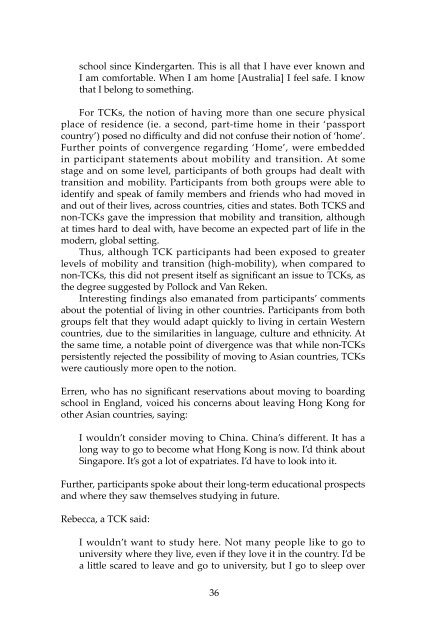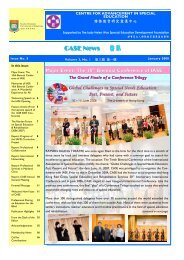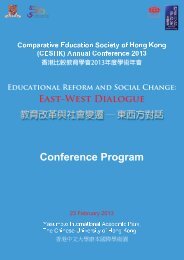Comparative Education Bulletin - Faculty of Education - The ...
Comparative Education Bulletin - Faculty of Education - The ...
Comparative Education Bulletin - Faculty of Education - The ...
Create successful ePaper yourself
Turn your PDF publications into a flip-book with our unique Google optimized e-Paper software.
school since Kindergarten. This is all that I have ever known and<br />
I am comfortable. When I am home [Australia] I feel safe. I know<br />
that I belong to something.<br />
For TCKs, the notion <strong>of</strong> having more than one secure physical<br />
place <strong>of</strong> residence (ie. a second, part-time home in their ‘passport<br />
country’) posed no difficulty and did not confuse their notion <strong>of</strong> ‘home’.<br />
Further points <strong>of</strong> convergence regarding ‘Home’, were embedded<br />
in participant statements about mobility and transition. At some<br />
stage and on some level, participants <strong>of</strong> both groups had dealt with<br />
transition and mobility. Participants from both groups were able to<br />
identify and speak <strong>of</strong> family members and friends who had moved in<br />
and out <strong>of</strong> their lives, across countries, cities and states. Both TCKS and<br />
non-TCKs gave the impression that mobility and transition, although<br />
at times hard to deal with, have become an expected part <strong>of</strong> life in the<br />
modern, global setting.<br />
Thus, although TCK participants had been exposed to greater<br />
levels <strong>of</strong> mobility and transition (high-mobility), when compared to<br />
non-TCKs, this did not present itself as significant an issue to TCKs, as<br />
the degree suggested by Pollock and Van Reken.<br />
Interesting findings also emanated from participants’ comments<br />
about the potential <strong>of</strong> living in other countries. Participants from both<br />
groups felt that they would adapt quickly to living in certain Western<br />
countries, due to the similarities in language, culture and ethnicity. At<br />
the same time, a notable point <strong>of</strong> divergence was that while non-TCKs<br />
persistently rejected the possibility <strong>of</strong> moving to Asian countries, TCKs<br />
were cautiously more open to the notion.<br />
Erren, who has no significant reservations about moving to boarding<br />
school in England, voiced his concerns about leaving Hong Kong for<br />
other Asian countries, saying:<br />
I wouldn’t consider moving to China. China’s different. It has a<br />
long way to go to become what Hong Kong is now. I’d think about<br />
Singapore. It’s got a lot <strong>of</strong> expatriates. I’d have to look into it.<br />
Further, participants spoke about their long-term educational prospects<br />
and where they saw themselves studying in future.<br />
Rebecca, a TCK said:<br />
I wouldn’t want to study here. Not many people like to go to<br />
university where they live, even if they love it in the country. I’d be<br />
a little scared to leave and go to university, but I go to sleep over<br />
36
















